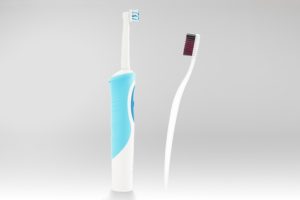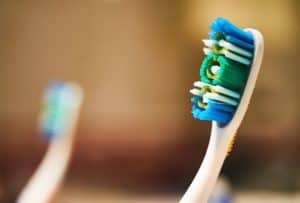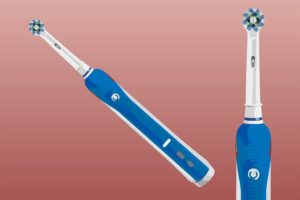Brushing your teeth is a vital procedure for a healthy life, not only for your oral health but your overall health too. Maintaining a healthy white smile can boost your self-esteem and happiness. Studies have also shown that regularly brushing your teeth can reduce your risk of heart disease, respiratory conditions, and even diabetes. So knowing the importance of oral hygiene, what is the best tool to use?
Selecting a toothbrush and properly brushing is one of the many ways you take care of yourself. Overall, the data indicates that the electric toothbrush has a slight edge over its manual counterpart but before you go out and buy an electric toothbrush, read on to learn more about which option is best for you.
A Brief History of the Manual Toothbrush
Research shows that toothbrushes or oral hygiene tools have been used for hundreds and even thousands of years. Chew sticks made by fraying the end of a stick were one of the original toothbrushes. Neem, miswak, and sewak sticks are still available today for a natural way to clean your teeth.
The Chinese were documented for using toothbrush-like tools as early as the 8th century. Although nylon bristles are used today; hog hairs were the original toothbrush bristle attached to a piece of bamboo or bone. It wasn’t until centuries later in the 1770’s in England that a man by the name of William Addis was thought to be responsible for the first mass-produced toothbrush. By 1840, toothbrushes were being mass produced not only in England, but in France, Germany, and Japan.
In 1859 the American Dental Association (ADA) was established to promote scientific research and quality professional standards in the oral hygiene industry. The ADA recommends that you brush your teeth for two minutes twice a day. Whether you choose a manual toothbrush or an electric toothbrush; when used properly, both will adequately cleanse your teeth, but which one is best?
Manual Toothbrush – The Classic Option
A a manual toothbrush is definitely the economical choice. A regular toothbrush might cost anywhere between $1 and $3. If bought in bulk at the store or online you might get a better deal bringing the cost down to $0.60 or $0.70 each.
While these are just your standard issue brushes, a more high-end toothbrush might include a tongue scraper and rubber tips that increase the blood flow to stimulate the gums while you are brushing. A high quality or specialized manual toothbrush may be priced approximately $5 to $10 per individual toothbrush.
Curved handle, handle size, textured grips, the softness to hardness of the bristles, size, and shape of the toothbrushes head are other basic features that one might consider when purchasing a manual toothbrush.
Manual Toothbrushes for Kids
Getting your kids to brush their teeth properly is often a concern for most parents. Brushing your child’s mouth can start before they even have teeth. Special toothbrushes and gum massagers for infants help promote oral and overall health care.
For kiddos with baby teeth, fun kid-sized, kid-oriented brushes make brushing easier. Bright colored oversized handled toothbrushes allow the child to brush independently while working or their dexterity. Many of their favorite cartoon characters and superheroes inspire youngsters to brush. Having your child’s toothbrush specially designed with their name is an inexpensive way to make a fun and health promoting gift.
Manual Toothbrushes with Timers
Some high-end toothbrushes have a timer built in to let you know when you have reached the recommended two minute brush time. Studies show that the average brusher only brushes for about 47 seconds. Studies also indicated that brushers were significantly more likely to brush for the full recommended two minutes if a toothbrush timer was used. Both adults and kids could benefit from a toothbrush with a timer if you are concerned that you or your child are not brushing long enough.
Eco-Friendly Manual Toothbrushes
Using a manual toothbrush can be slightly harmful to the planet due to all the waste. Specialty and innovative oral hygiene products such as an eco-friendly toothbrush with bamboo handles or manual toothbrushes made of wood or flax that you can replace just the head have been designed to help reduce waste.
A charcoal toothbrush with bamboo handle is marketed to both eco-friendly and health conscious consumers. The charcoal feature is known for polishing the teeth and removing stains. In addition to the whiting effects of charcoal, studies show that the charcoal can also be effective in reducing bacteria that cause halitosis or “bad breath.” If you struggle with bad breath selecting an alternative toothbrush might be the right choice.
Manual Toothbrush Bristle Options
You want to have a pleasant experience brushing your teeth. Depending on how vigorously you brush, a soft bristle brush may be the safest and more comfortable choice. Some medium and especially hard bristled toothbrushes may cause damage to the tooth’s root, surface, and even the enamel. Hard bristles can actually harm the gums too. You do not want your gums cut up or scratched post brushing. Selecting the right toothbrush may take some trial and error. You’ll know if the toothbrush you select is the right choice for you.
When to replace Your Manual Toothbrush
Some toothbrushes have a built-in feature that lets you know when you need to replace it. A blue or another color may be incorporated into the bristle and as the color fades and decreases you’ll know when you need to get a new one. If your toothbrush does not have the handy-dandy color indicator, the ADA suggests replacing your brush every three to four months or sooner if the bristles are flattened out or frayed. While the ADA suggests replacing your brush every three to four months, most dental professionals highly recommend that you get a new toothbrush every three months.
Cleaning Your Manual Toothbrush
While many of us are aware that we need to replace our toothbrushes every three months, how many of us are actually cleaning our toothbrushes on a regular basis. Cleaning your toothbrush once a week is recommended by many dental professionals.
Bacteria and viruses can linger on a toothbrush; so keeping your toothbrush clean, especially during cold and flu season can be helpful. For everyday sanitizing, you can use peroxide. If you store the toothbrush in a small container of peroxide, just be sure to rinse out the container and use new peroxide after every use. This method can be utilized daily or periodically to suit your needs.
Soaking your toothbrush in antibacterial mouthwash, such as Listerine, is also an effective method for removing germs. Be sure to rinse the toothbrush before you brush again.
If you need to sterilize a toothbrush and do not have these other solutions on hand, you can always boil the toothbrush. Boiling the toothbrush should kill almost any germs. Boil for about 3 minutes. This method may be hard on the toothbrush, but effective when needed.
A more costly but very effective way to sanitize your toothbrush is available through purchasing a UV toothbrush sanitizer. UV sanitizers use steam along with dry heat to clean the toothbrush. Many selections exist on the market and have been researched and proven effective.
Cleaning and replacing your manual toothbrush regularly is important and only is a small investment for your health.
The Invention of the Electric Toothbrush
Manually brushing your teeth will get the job done. But beyond the plethora of manual toothbrushes to choose from, there are just as many electric toothbrushes on the market.
The concept of the first usable electric toothbrush was brought to life in 1954 by a Swiss doctor. At the time, the toothbrush was created specifically for individuals with disabilities as well as orthodontic clientele. Many makes and models have been produced since the first prototype was created.
Electric Toothbrushes for Individuals with Special Needs
Electric toothbrushes were invented to help people with deficient motor skills. For elderly individuals with arthritis or people with disabilities, an electric toothbrush may assist the person in maintaining their independence and maintaining their oral hygiene.
Electric Toothbrushes for Kids
Choosing an electric toothbrush might be your best option if your kids or teenagers are more excited or willing to brush their teeth regularly. Some electric toothbrushes are specifically designed for kids with fun bright colors or with their favorite cartoon characters. Some even light up or play music for the two minutes suggested brush time. In addition to keeping them excited about brushing their teeth, an electric toothbrush does some of the work for them, so you know that they are keeping their teeth as clean as possible.
Electric toothbrushes are also highly recommended for orthodontic patients to help keep the teeth and dental hardware or braces free of food that could lead to cavities if not properly cleaned and cared for.
Features of Electric Toothbrushes
A very basic electric toothbrush, a toothbrush with a battery can be purchased for about $20 and then the price increases from there depending on quality and features. Some of the best electric toothbrush companies suggest a brush head and battery replacement subscription. A toothbrush subscription ensures your electric toothbrush replacement heads, batteries, and even toothpaste are delivered to your door every three months.
You can expect to pay $40 to $70 for a quality standard electric toothbrush. A variety of features to enhance the oral cleansing experience such as bristles rotating in opposing directions and rubber gum massagers are things you want to consider before making this small investment.
One brand claims their electric toothbrush simulates 40,000 tiny brush strokes per minute to clean the teeth. Charging stations with self-cleaning UV mechanisms to kill any germs are features some consumers seek.
The best electric toothbrush deluxe models may include a water pick. Water picks also referred to as oral pulsating irrigators, provide a stream of water that gently helps clean the teeth and remove food particles from difficult to reach places in the mouth. Although this device is helpful it is not considered a substitute for brushing or flossing.
Bluetooth for Electric Toothbrushes
Yes folks, today electric toothbrushes can be equipped with a Bluetooth feature that will send data to an app on your phone to let you know how you are brushing. Information such as how long you brush, how hard you brush, and how much you brush will be documented. An electric toothbrush with Bluetooth and all the bells and whistles can cost up to $250. This is a costly choice but could be well worth it if such a device is properly used to maintain your oral health.
Charging Your Electric Toothbrush
You must consider that an electric toothbrush must be battery operated (with batteries) or charged on a charging station that requires electricity. Some charging stations may be bulky. Some charging stations include a USB charging cord. Lower end electric toothbrushes may maintain their charge for two to three days. These may be great for home use but not for extensive travel, unless you take the charging base with you. One high-end toothbrush model claims that the charge can last up to three weeks. These are all factors you may want to consider when purchasing an electric toothbrush.
American Dental Association Seal of Approval
As previously mentioned, selecting the right toothbrush may include some trial and error, but the ADA offers their expertise in the matter. Whether you are selecting a manual toothbrush or an electric toothbrush, the well known dental organization researches and evaluates the oral hygiene products currently available on the market. The ADA has established test standards for toothbrush quality and safety. The ADA Seal of Acceptance has been created to help consumers identify these products that have been examined and approved. Look for the ADA Seal of Acceptance when selecting your next toothbrush.
The Verdict: Manual Versus Electric Toothbrush
As we discussed earlier, the electric toothbrush has a slight advantage over a manual toothbrush but there are many factors that contribute to one’s oral health. While brushing your teeth plays a key role in making sure you have excellent oral health, regular visits to your dentist are also essential. Routine professional oral screening and cleanings will help keep you and your teeth healthy and happy.
If you are new to the Boulder area or just looking for a new dentist, give Dr. Evan’s office a call today to schedule an appointment.



